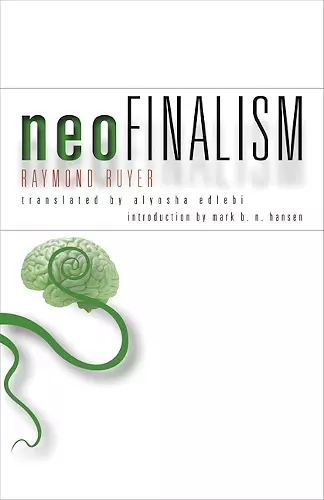Neofinalism
Raymond Ruyer author Alyosha Ruyer translator
Format:Paperback
Publisher:University of Minnesota Press
Published:15th Feb '16
Should be back in stock very soon

Although little known today, Raymond Ruyer was a post–World War II French philosopher whose works and ideas were significant influences on major thinkers, including Deleuze, Guattari, and Simondon. With the publication of this translation of Neofinalism, considered by many to be Ruyer’s magnum opus, English-language readers can see at last how this seminal mind allied philosophy with science.
Unfazed by the idea of philosophy ending where science began, Ruyer elaborated a singular, nearly unclassifiable metaphysics and reactivated philosophy’s capacity to reflect on its canonical questions: What exists? How are we to account for life? What is the status of subjectivity? And how is freedom possible? Ha
Neofinalism offers a systematic and lucidly argued treatise that deploys the innovative concepts of self-survey, form, and absolute surface to shape a theory of the virtual and the transspatial. It also makes a compelling plea for a renewed appreciation of the creative activity that organizes spatiotemporal structures and makes possible the emergence of real beings in a dynamic universe.
"Raymond Ruyer's work is remarkably prescient and provocative, providing a profound philosophy of life and evolution that deserves to be re-read today alongside contemporary vitalisms and new materialisms. This is a significant text in the history and philosophy of science, skillfully translated by Alyosha Edlebi."-Claire Colebrook, Pennsylvania State University
"Raymond Ruyer is a rare, unsung genius, equally at home in the biological, physical, and technical sciences as he is in philosophy and the humanities. Neofinalism is one of those books that change the way we think. He draws our attention to the fact that matter and life are not just random collections but are matter directed by an ideal, a memory that informs all primary forms, all forms of consciousness. More than any other thinker, he opens up the concept of consciousness to all its inhuman ingredients and orientations."-Elizabeth Grosz, Duke University
ISBN: 9780816692057
Dimensions: 216mm x 140mm x 38mm
Weight: unknown
336 pages